Bio 161 exam 4 - Study guides, Class notes & Summaries
Looking for the best study guides, study notes and summaries about Bio 161 exam 4? On this page you'll find 47 study documents about Bio 161 exam 4.
All 47 results
Sort by
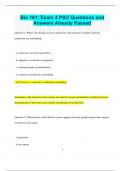
-
Bio 161: Exam 4 PSU Questions and Answers Already Passed
- Exam (elaborations) • 31 pages • 2024
-
Available in package deal
-
- $10.49
- + learn more
Bio 161: Exam 4 PSU Questions and Answers Already Passed Question 1: What is the skeletal system composed of, and what does it balance between production and remodeling? - a. connective; growth; regeneration - b. supportive; ossification; integration - c. structural; repair; transformation - d. connective; production; remodeling - Answer: d. connective; production; remodeling Explanation: The skeletal system consists of connective tissue and maintains a balance between the pro...
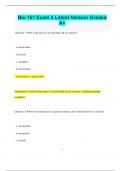
-
Bio 161 Exam 4 Latest Version Graded A+
- Exam (elaborations) • 19 pages • 2024
-
Available in package deal
-
- $9.99
- + learn more
Bio 161 Exam 4 Latest Version Graded A+ Question 1: What is the term for an individual cell of a muscle? - a. muscle fiber - b. fascicle - c. myofibril - d. sarcolemma - Answer: a. muscle fiber Explanation: A muscle fiber refers to an individual cell of a muscle, containing multiple myofibrils. Question 2: What is the name given to a group of muscle cells within the belly of a muscle? - a. sarcolemma - b. sarcoplasm - c. fascicle 2 - d. myofibril - Answer:...
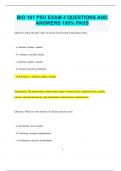
-
BIO 161 PSU EXAM 4 QUESTIONS AND ANSWERS 100% PASS
- Exam (elaborations) • 11 pages • 2024
-
Available in package deal
-
- $9.99
- + learn more
BIO 161 PSU EXAM 4 QUESTIONS AND ANSWERS 100% PASS Question: Name the three types of muscle tissue found in the human body. - a. skeletal, cardiac, striated - b. voluntary, smooth, cardiac - c. skeletal, cardiac, smooth - d. striated, smooth, involuntary - Answer: c. skeletal, cardiac, smooth Explanation: The human body contains three types of muscle tissue: skeletal muscle, cardiac muscle, and smooth muscle, each with distinct characteristics and functions. Question: What a...
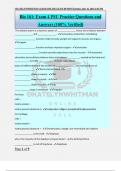
-
Bio 161: Exam 4 PSU Practice Questions and Answers (100% Verified)
- Exam (elaborations) • 9 pages • 2024
- Available in package deal
-
- $12.49
- + learn more
Bio 161: Exam 4 PSU Practice Questions and Answers (100% Verified)
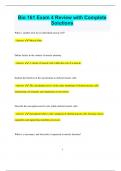
-
Bio 161 Exam 4 Review with Complete Solutions
- Exam (elaborations) • 8 pages • 2024
-
Available in package deal
-
- $9.99
- + learn more
Bio 161 Exam 4 Review with Complete Solutions What is another term for an individual muscle cell? - Answer: Muscle fiber Define fasicle in the context of muscle anatomy. - Answer: A cluster of muscle cells within the core of a muscle. Explain the function of the sarcolemma in skeletal muscle cells. - Answer: The sarcolemma serves as the outer membrane of skeletal muscle cells, maintaining cell integrity and regulating ion movement. Describe the sarcoplasm and its role wit...
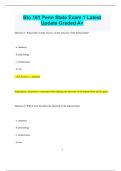
-
Bio 161 Penn State Exam 1 Latest Update Graded A+
- Exam (elaborations) • 18 pages • 2024
-
Available in package deal
-
- $9.99
- + learn more
Bio 161 Penn State Exam 1 Latest Update Graded A+ Question 1: What field of study focuses on the structure of the human body? - a. anatomy - b. physiology - c. homeostasis - d. ion - Answer: a. anatomy Explanation: Anatomy is concerned with studying the structure of the human body and its parts. Question 2: Which term describes the function of the human body? - a. anatomy - b. physiology - c. homeostasis - d. ion 2 - Answer: b. physiology Explanation: Physio...
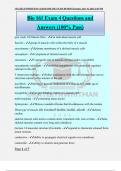
-
Bio 161 Exam 4 Questions and Answers (100% Pass)
- Exam (elaborations) • 7 pages • 2024
- Available in package deal
-
- $11.49
- + learn more
Bio 161 Exam 4 Questions and Answers (100% Pass)
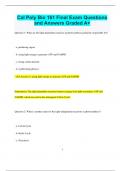
-
Cal Poly Bio 161 Final Exam Questions and Answers Graded A+
- Exam (elaborations) • 32 pages • 2024
-
- $10.49
- + learn more
Cal Poly Bio 161 Final Exam Questions and Answers Graded A+ Question 1: What are the light-dependent reactions in photosynthesis primarily responsible for? - a. producing sugars - b. using light energy to generate ATP and NADPH - c. fixing carbon dioxide - d. synthesizing glucose - Answer: b. using light energy to generate ATP and NADPH Explanation: The light-dependent reactions harness energy from light to produce ATP and NADPH, which are used in the subsequent Calvin Cycle. ...
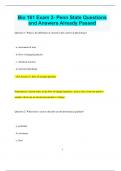
-
Bio 161 Exam 2- Penn State Questions and Answers Already Passed
- Exam (elaborations) • 19 pages • 2024
-
Available in package deal
-
- $9.99
- + learn more
Bio 161 Exam 2- Penn State Questions and Answers Already Passed Question 1: What is the definition of current in the context of physiology? - a. movement of ions - b. flow of charged particles - c. chemical reaction - d. electrical discharge - Answer: b. flow of charged particles Explanation: Current refers to the flow of charged particles, such as ions, from one point to another, driven by an electrical potential or voltage. Question 2: What term is used to describe an el...
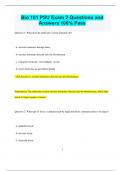
-
Bio 161 PSU Exam 2 Questions and Answers 100% Pass
- Exam (elaborations) • 14 pages • 2024
-
Available in package deal
-
- $9.99
- + learn more
Bio 161 PSU Exam 2 Questions and Answers 100% Pass Question 1: What does the endocrine system primarily do? - a. secretes hormones through ducts - b. secretes hormones directly into the bloodstream - c. transports hormones via lymphatic vessels - d. stores hormones in specialized glands - Answer: b. secretes hormones directly into the bloodstream Explanation: The endocrine system releases hormones directly into the bloodstream, which then travel to target organs or tissues. ...

$6.50 for your textbook summary multiplied by 100 fellow students... Do the math: that's a lot of money! Don't be a thief of your own wallet and start uploading yours now. Discover all about earning on Stuvia


